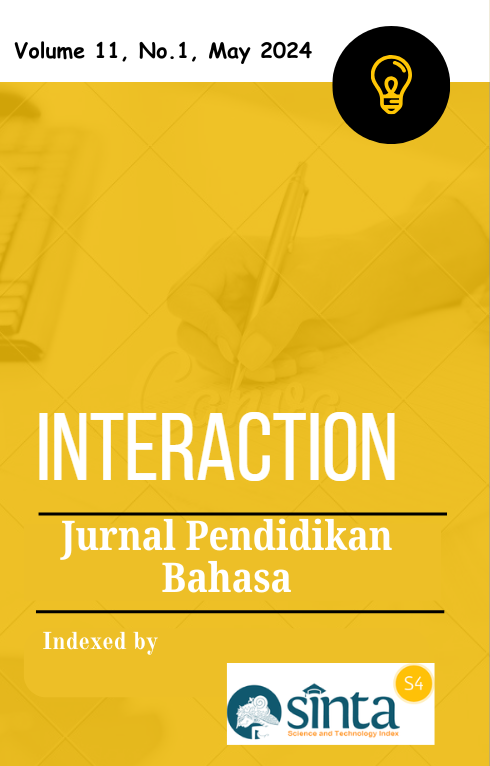A Positive Perspective Study of Online Game: Children's English Acquisition from Online Game Habit
Abstract
The phenomenon of online gaming is certainly a concern for all parents. Not only in Indonesia but also around the world. Ternate North Maluku is one of the cities in Indonesia that became the site of this current study, which explains the phenomenon of online games taking place and their role in children's autonomous English learning. This study is located in Jerbus Village, South Ternate. To provide more honest and accurate data, the interviews were semi-structured with 11 children aged 7 to 12 years old. Employing a descriptive qualitative design, the data analysis and interpretation used raw data, preparing data for analysis, collecting the data on the computer, coding data, relating themes, and interpreting the meaning of themes and descriptions (Creswell, 2009, p. 185). The results of this study explain that online games encourage children to learn English independently without any coercion from others. It also helps them learn English naturally and contributes to children's English acquisition. This research conclusion is that online games have so far only been considered to bring negative influences to children who have been addicted, such as the absence of socialization, lack of social interaction, affecting the quality of learning, and many other negative influences. This current study proves that online games also have a positive side. The positive role is to replace lost face-to-face social interaction with online interaction. In addition, the online game stimulated children's communication using English
Downloads
References
Ashraf, H., Motlagh, F., & Salami, M. (2014). The Impact of Online Games on Learning the Impact of Online Games on Learning English Vocabulary by Iranian (Low-Intermediate) EFL Learners. Elseiver, 98, 286-291. https://doi.org/10.1016/j.sbspro.2014.03.418
Asmiati, L., Pratiwi, I. A., & Fardhani, M. (2021). Dampak Penggunaan Game Online Terhadap Kemampuan Berkomunikasi Anak. Jurnal Ilmiah P2M STKIP Siliwangi, 8(1), 37-45. https://doi.org/10.22460/p2m.v8i1p37-45.2227
Ariantoro, T. R. (2016). Dampak Game Online terhadap Prestasi Belajar Pelajar. JUTIM (Jurnal Teknik Informatika Musirawas), 1(1), 1-15.
Amri, S. R. (2023). Peran Orangtua dalam Meminimalisir Kecanduan Game Online Pada Anak. Jurnal RISET Golden Age PAUD UHO, 3 (3), 255-259.Barzilai, S., & Blau, I. (2014). Scaffolding Game-Based Learning: Impact on Learning Achievements, Perceived Learning and Game Experiences. Computer & Education. Elsevier, 70, 65-79. https://doi.org/10.1016/j.compedu.2013.08.003
Borg, S., & Al-Busaidi, S. (2012). Learner Autonomy: English Language Teachers’ Beliefs and Practices. University of Leeds.
Chik, A. (2012). Digital Gameplay for Autonomous Foreign Language Learning: Gamers’ and Language Teachers’ Perspectives in Digital Games in Language Learning and Teaching. London: Palgrave Macmillan UK. https://doi.org/10.1057/9781137005267_6
Chik, A. (2014). Digital Gaming and Language Learning: Autonomy And Community. Language Learning & Technology, 18(2), 85-100.
De Villiers, J., & De Villiers, P. (2017). The Acquisition of English in the Cross Linguistic Study of Language Acquisition (pp. 27-139). Psychology Press.
Dourda, K., Bratitsis, T., Griva, E., & Papadopoulou, P. (2014). Content and Language Integrated Learning through An Online Game in Primary School: A Case Study. Electronic Journal of e-Learning, 12(3), 243-258.
Ellis, R. (1989). Second Language Learning and Second Language Learners: Growth and Diversity. TESL Canada Journal, 7(1), 74-94.
Guo, Y. (2007). Autonomous English Learning Among Postgraduate EFL Learners in China: A Study of Attitudes and Behaviors. Journal of Asia TEFL, 4(3), 47-70.
Hussin, S., Maarof, N., & D’cruz, J. (2001). Sustaining An Interest in Learning English and Increasing the Motivation to Learn English: An Enrichment Program. The Internet TESL Journal, 7(5), 1-7.
Hasram, S., Nasir, M., Mohamad, M., Daud, M., Abd Rahman, M., & Mohammad, W. (2021). The Effects of Wordwall Online Games (Wow) on English Language Vocabulary Learning Among Year 5 Pupils. Theory and Practice in Language Studies, 11(9), 1059-1066. https://doi.org/10.17507/tpls.1109.11
Herrera, L., Largo R., & Viáfara, J. (2019). Online Peer-Tutoring: A Renewed Impetus for Autonomous English Learning, 26(2), 13-31. https://doi.org/10.19183/how.26.2.503
Horowitz, K. S. (2019). Video Games and English as A Second Language: The Effect of Massive Multiplayer Online Video Games on the Willingness to Communicate and Communicative Anxiety of College Students in Puerto Rico. American Journal of Play, 11(3), 379-410.
Hermawan, D., & Kudus, A. (2021). Peran Orang Tua dalam Mencegah Anak Kecanduan Bermain Game Online di Era Digital. Jurnal Pendidikan Indonesia, 2(05), 778-789. https://doi.org/10.59141/japendi.v2i05.171
Iskandar, R. (2021). Analisis Tingkat Kecanduan Bermain Game Online terhadap Siswa Sekolah Dasar. Jurnal Basicedu, 5(6), 5660-5670. https://doi.org/10.31004/basicedu.v5i6.1738
Kuo, M. J. (2007). How Does An Online Game Based Learning Environment Promote Students' Intrinsic Motivation for Learning Natural Science and How Does It Affect Their Learning Outcomes?. IEEE. 135-142. https://doi.org/10.1109/DIGITEL.2007.28
Kustiawan, A., Or, M., Utomo, A, & Or, M. (2019). Jangan Suka Game Online: Pengaruh Game Online dan Tindakan Pencegahan. Cv. Ae Media Grafika.
Krashen, Stephen D. (1981). Second Acquisition and Second Language Learning (University of Southern California: Pergamon Press Inc.
Liando, N. (2012). Factors Affecting A Successful Language Learner. Indonesian JELT: Indonesian Journal of English Language Teaching, 8(1), 22-50. https://doi.org/10.25170/ijelt.v8i1.1529
Malik, F. (2021). An Analysis of the Strategy in Acquiring Vocabulary Using Video Games in English Literature Students of Universitas Brawijaya. Uiversitas Brawijaya. https://doi.org/10.61290/gm.v11i1.219
Mika, M., & Mardiana, N. (2023). Edukasi Pentingnya Bahasa Inggris di Era Globalisasi. BERNAS: Jurnal Pengabdian Kepada Masyarakat, 4(1), 246-251. https://doi.org/10.31949/jb.v4i1.3961
Meutia, P., Fahreza, F., & Rahman, A. A. (2020). Analisis Dampak Negatif Kecanduan Game Online terhadap Minat Belajar Siswa di Kelas Tinggi SD Negeri Ujong Tanjong. Jurnal Genta Mulia, 11(1), 22-32.
Ondang, G. L., Mokalu, B. J., & Goni, S. Y. (2020). Dampak Game Online terhadap Motivasi Belajar Mahasiswa Jurusan Sosiologi Fispol Unsrat. Holistik, Journal of Social and Culture. 13(2), 1-15.
Pallawagau, B., & Rasna, R. (2022). Pemerolehan Bahasa Asing sebagai Bahasa Kedua (Kajian Pemerolehan Bahasa Arab). JAEL: Journal of Arabic Education and Linguistic, 2(2), 64-76. https://doi.org/10.24252/jael.v2i2.31151
Purba, A. (2013). Peranan Lingkungan Bahasa dalam Pemerolehan Bahasa Kedua. Pena: Jurnal Pendidikan Bahasa dan Sastra, Infromation, 2(2). 13(2), 1-15
Putra, F., Rozak, A., Perdana, G., & Maesharoh, I. (2019). Dampak Game Online terhadap Perubahan Perilaku Sosial Mahasiswa Telkom University: Jurnal Politikom Indonesiana, 4(2), 98-103.
Paige, R. M., Jorstad, H. L., Siaya, L., Klein, F., Colby, J., Lange, D., & Paige, R. (2003). Culture Learning in Language Education. Culture As the Core: Perspectives on Culture in Second Language Learning. Age Publishing, 173-236.
Retrieved From https://databoks.katadata.co.id/datapublish/2022/02/16/jumlah-gamers-indonesia-terbanyak-ketiga-di-dunia,
Rogers, A. (2014). The Classroom and the Everyday: The Importance of Informal Learning for Formal Learning. Investigar Em Educação, 2(1),7-34.
Sundara, K., Hafsah, H., & Nasar, M. A. (2020). Pengaruh Negatif Game Online terhadap Motivasi Belajar Siswa di SMKN 1 Narmada. Civicus, 8(2), 84-90. https://doi.org/10.31764/civicus.v8i2.2885
Schurtz, I. M., Pfost, M., Nagengast, B., & Artelt, C. (2014). Impact of Social and Dimensional Comparisons on Student's Mathematical and English Subject-Interest at the Beginning of Secondary School. Learning and Instruction. Elsevier, 34, 32-41. https://doi.org/10.1016/j.learninstruc.2014.08.001
Setiyadi, A., & Salim, U. (2013). Pemerolehan Bahasa Kedua Menurut Stephen Krashen. At-Ta'dib, 8(2), 265-280. https://doi.org/10.21111/at-tadib.v8i2.504
Thomas, M. (1989). The Acquisition of English Articles by First- and Second-Language Learners. Applied Psycholinguistics. Cambridge University Press, 10(3), 335-355. https://doi.org/10.1017/S0142716400008663
Turgut, Y., & İrgin, P. (2009). Young Learners’ Language Learning Via Computer Games. Procedia-Social and Behavioral Sciences, Elsevier, 1(1), 760-764. https://doi.org/10.1016/j.sbspro.2009.01.135
Thorne, S., Black, R., & Sykes, J. M. (2009). Second Language Use, Socialization, and Learning in Internet Interest Communities and Online Gaming. The Modern Language Journal, 93(1), 802-821. https://doi.org/10.1111/j.1540-4781.2009.00974.x
Tyas, P., Perdhani, W., & Budiana, N. (2022). Second Language Acquisition and Teaching: Sebuah Pendahuluan, Media Nusa Creative (MNC Publishing).
Wang, C. (2004). Self-Regulated Learning Strategies and Self-Efficacy Beliefs of Children Learning English as A Second Language. The Ohio State University.
Warschauer, M., & Liaw, M. L. (2011). Emerging Technologies for Autonomous Language Learning. Studies in Self-Access Learning Journal, 2(3). 107-118.
Zendrato, Y., & Harefa, H. (2022). Dampak Game Online terhadap Prestasi Belajar Siswa. Educativo: Jurnal Pendidikan, 1(1), 139-148. https://doi.org/10.56248/educativo.v1i1.21
Zhong, Y. (2008). A Study of Autonomy English Learning on the Internet. English Language Teaching. Eric, 1(2), 147-150.




.png)



22.png)
